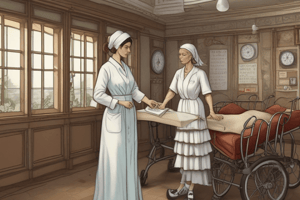Podcast
Questions and Answers
What was the main focus of nursing practice during the Apprenticeship Model era?
What was the main focus of nursing practice during the Apprenticeship Model era?
principles and traditions handed down through practice
Which eras of nursing emphasized the need for specialized knowledge?
Which eras of nursing emphasized the need for specialized knowledge?
- Curriculum Era, Research Era (correct)
- Graduate Education Era, Theory Era
- Apprenticeship Model, Theory Utilization Era
- Theory Era, Theory Utilization Era
According to Fawcett, nursing models are classified as paradigms with a meta-paradigm of Person, Environment, and Nursing Concepts.
According to Fawcett, nursing models are classified as paradigms with a meta-paradigm of Person, Environment, and Nursing Concepts.
True (A)
___ concerns the theory of knowledge in philosophical inquiry or how knowledge came to be.
___ concerns the theory of knowledge in philosophical inquiry or how knowledge came to be.
Match the following terms with their definitions:
Match the following terms with their definitions:
What is the nickname given to Florence Nightingale due to her actions during the Crimean War?
What is the nickname given to Florence Nightingale due to her actions during the Crimean War?
What are the components of environment according to Nightingale?
What are the components of environment according to Nightingale?
According to Nightingale's theory, unnecessary noise can be beneficial for the patient's recovery.
According to Nightingale's theory, unnecessary noise can be beneficial for the patient's recovery.
Which of the following are/is correct with the following historical eras of Nursing, except?
Which of the following are/is correct with the following historical eras of Nursing, except?
What era noted that the outcome of Nursing theoretical works shifted the focus to the patient?
What era noted that the outcome of Nursing theoretical works shifted the focus to the patient?
This is defined as specific to academia and refers to a branch of education, a department of learning or a domain of knowledge.
This is defined as specific to academia and refers to a branch of education, a department of learning or a domain of knowledge.
All but one constitutes the following criteria of a profession:
All but one constitutes the following criteria of a profession:
Which era has the emphasis of “carving out an advanced role and basis for nursing practice”
Which era has the emphasis of “carving out an advanced role and basis for nursing practice”
Which of the following theorists presents the first nursing theory?
Which of the following theorists presents the first nursing theory?
The following are the components of a healthy environment, except:
The following are the components of a healthy environment, except:
Which of the following is true about Florence Nightingale? (Select all that apply)
Which of the following is true about Florence Nightingale? (Select all that apply)
What is being described as simultaneous order and disorder, and order within disorder?
What is being described as simultaneous order and disorder, and order within disorder?
Which stage is characterized by a person lacking background experience of the situation they are involved in, and typically involves nursing students or professional nurses assigned to an unfamiliar area?
Which stage is characterized by a person lacking background experience of the situation they are involved in, and typically involves nursing students or professional nurses assigned to an unfamiliar area?
What trait does an expert nurse demonstrate according to the provided content?
What trait does an expert nurse demonstrate according to the provided content?
Illness is the human lived experience of loss of function or dysfunction.
Illness is the human lived experience of loss of function or dysfunction.
According to the content, the ______ is defined as an interpretively defined area of skilled performance identified and described by its intent, functions, and meanings.
According to the content, the ______ is defined as an interpretively defined area of skilled performance identified and described by its intent, functions, and meanings.
It is every nurse's duty and moral obligation to care for his or her patient not by merely looking into and caring for his or her physical ______.
It is every nurse's duty and moral obligation to care for his or her patient not by merely looking into and caring for his or her physical ______.
What does the Dreyfus Model describe?
What does the Dreyfus Model describe?
Florence Nightingale came from a wealthy family and her name was derived from her birthplace.
Florence Nightingale came from a wealthy family and her name was derived from her birthplace.
Her parents wanted her to be a nurse.
Her parents wanted her to be a nurse.
After publishing her books, she got married by the age of 30.
After publishing her books, she got married by the age of 30.
According to Jean Watson, how does she define the essence of Nursing?
According to Jean Watson, how does she define the essence of Nursing?
What does Patricia Benner believe is the essence of nursing practice?
What does Patricia Benner believe is the essence of nursing practice?
Which of the following are true statements regarding epistemology? (Select all that apply)
Which of the following are true statements regarding epistemology? (Select all that apply)
Which of the following differentiates Rationalism from Empiricism? (Select all that apply)
Which of the following differentiates Rationalism from Empiricism? (Select all that apply)
A research then theory approach falls under which principle?
A research then theory approach falls under which principle?
A nurse tries to gather data so the physician can have a diagnosis of the patient. This example falls under which principle?
A nurse tries to gather data so the physician can have a diagnosis of the patient. This example falls under which principle?
What is a set of statements that tentatively describe, explain, or predict relationships among concepts?
What is a set of statements that tentatively describe, explain, or predict relationships among concepts?
Which of the following is a component of theory development?
Which of the following is a component of theory development?
What type of concept is more specific in time or place?
What type of concept is more specific in time or place?
What is Operational Definition defined as?
What is Operational Definition defined as?
Which type of statements relate concepts to measurements?
Which type of statements relate concepts to measurements?
What is true about theory and scientific law?
What is true about theory and scientific law?
Born August 10, 1820. ANSWER: ________
Born August 10, 1820. ANSWER: ________
She defined Nursing as:
She defined Nursing as:
This work of Florence provided guidelines to women who wanted to become nurses and gave advice on how to:
This work of Florence provided guidelines to women who wanted to become nurses and gave advice on how to:
The nurse is actually in control of the environment, physically, and administratively and is responsible for controlling the environment so that the patient is protected from physical and psychological harm. This falls on what component of a healthy environment?
The nurse is actually in control of the environment, physically, and administratively and is responsible for controlling the environment so that the patient is protected from physical and psychological harm. This falls on what component of a healthy environment?
Health is defined by Nightingale as?
Health is defined by Nightingale as?
It was during this war when Nightingale volunteered her services along with 38 other nurses.
It was during this war when Nightingale volunteered her services along with 38 other nurses.
In what component of a healthy environment includes taking a bath daily and that nurses should also bathe daily while keeping their duty uniforms clean and their hands washed clean?
In what component of a healthy environment includes taking a bath daily and that nurses should also bathe daily while keeping their duty uniforms clean and their hands washed clean?
All of the following are her major contributions in nursing in terms of education, except?
All of the following are her major contributions in nursing in terms of education, except?
Where did Jean Watson become a Dean?
Where did Jean Watson become a Dean?
Transpersonal caring involves requires an interaction which includes:
Transpersonal caring involves requires an interaction which includes:
The Humanistic-altruistic system of value corresponds to clinical process:
The Humanistic-altruistic system of value corresponds to clinical process:
She defined person as, except:
She defined person as, except:
This is called the moment (focal point in space and time) when the nurse and another person come together in such a way that an occasion for human caring is created:
This is called the moment (focal point in space and time) when the nurse and another person come together in such a way that an occasion for human caring is created:
The theory of Jean Watson constitutes the carative factors turned into clinical processes. Which of the following are the carative factors, except?
The theory of Jean Watson constitutes the carative factors turned into clinical processes. Which of the following are the carative factors, except?
Included in the carative factor is the Creative problem-solving caring process which evolved into what clinical processes?
Included in the carative factor is the Creative problem-solving caring process which evolved into what clinical processes?
One concept Watson defined is transpersonal caring which means?
One concept Watson defined is transpersonal caring which means?
Watson believes that the essence of nursing is:
Watson believes that the essence of nursing is:
All of the following are true to applications of her theory to the nursing practice, except?
All of the following are true to applications of her theory to the nursing practice, except?
Flashcards are hidden until you start studying
Study Notes
Theoretical Foundations in Nursing
History of Nursing Theory
- Florence Nightingale is considered the founder of modern nursing, emphasizing the importance of a clean and healthy environment for patient recovery.
- Nursing evolved through different eras, from a vocational course to a recognized profession and academic discipline.
Historical Eras of Nursing's Search for Specialized Knowledge
- Curriculum Era (1900-1940s): standardization of nursing education and curriculum development.
- Research Era (1950-1970s): focus on nursing research, problem studies, and nurses' roles in healthcare development.
- Graduate Education Era (1950-1970s): emphasis on advanced nursing education and knowledge development.
- Theory Era (1980-1990s): development of nursing theories, frameworks, and models to guide research and practice.
- Utilization Era (21st century): focus on evidence-based practice, quality care, and nursing frameworks.
Significance of Nursing Theory
- Nursing theory guides research, practice, education, and administration.
- Recognized as a discipline and profession, with a distinct body of knowledge and practice abilities.
Criteria for the Development of Professional Status of Nursing
- Utilizes a well-defined and organized body of specialized knowledge.
- Constantly enlarges knowledge and improves techniques through scientific methods.
- Entrusts education to universities and colleges.
- Applies knowledge in practical services important to community welfare.
- Functions autonomously in developing professional policy.
- Attracts individuals with intellectual and personal qualities.
- Strives to compensate nurses with freedom of action, continuous professional growth, and economic security.
Historical Views of the Nature of Science
- Epistemology: the study of knowledge, understanding, and the nature of science.
- Rationalism: priori reasoning, deductive, and intellectual source of knowledge.
- Empiricism: sensory experience, inductive, and experiential source of knowledge.
Philosophical Foundations of Science
- Positivism: emerged as the dominant view of modern science in the early 20th century.
- Phenomenological Approach: reduces observations to the meanings of phenomena independent of context.
Theory Development Process
- Theory: a set of statements that tentatively describe, explain, or predict relationships among concepts.
- Categories of Theory Components: concepts, definitions, and propositions.
- 10 Phases of Concept Building Process: from writing a meaningful practice story to creating a mini-synthesis.
Scientific Law vs. Theory
- Scientific Law: a statement of fact that explains an action or set of actions, simple, true, universal, and absolute.
- Theory: more complex, dynamic, and developed from the scientific method, accepted as true and proven.### The Impact of TV and Smoking on Health
- Watching excessive amounts of TV reduces a person's ability to concentrate
- Smoking leads to lung cancer
Contemporary Issues in Nursing Theory Development
- Theoretical boundaries and levels are proposed to advance nursing science
- Theory-testing research may lead to the development of new nursing theories that explain nursing phenomena more adequately
Historical Eras of Nursing
- Curriculum Era: 1900s-1920s
- Research Era: 1950s-1980s
- Graduate Education Era: 1950s-1980s
- Theory Utilization Era: 21st century
Definition of Discipline
- A discipline is a branch of education, a department of learning, or a domain of knowledge
Criteria of a Profession
- A profession utilizes a well-defined and well-organized body of specialized knowledge
- A profession entrusts the education of its practitioners to universities/colleges
- A profession functions autonomously in developing professional policy
Epistemology
- Epistemology is the branch of philosophy concerned with the nature and scope of knowledge
- It is the study of knowledge and justifies beliefs
Rationalism and Empiricism
- Rationalism is a principle that uses rational thinking
- Empiricism is a principle that states knowledge is based on experience
- A research-then-theory approach falls under Empiricism
Theory Development
- A theory is a set of statements that tentatively describe, explain, or predict relationships among concepts that have been systematically selected and organized as an abstract representation of some phenomenon
- Components of theory development include concepts, relational statements, and linkages and ordering
- Operational definition is how concepts are used or will be used within the context of the phenomenon
Florence Nightingale
- Florence Nightingale (1820-1992) is known as the Mother of Modern Nursing
- Her nursing theory focuses on the manipulation of the environment for the benefits of the patient
- Her book "Notes on Nursing" presents her nursing theory
- She is known for her work during the Crimean War, where she volunteered her services and was eventually given permission to take a group of 38 nurses to Turkey### Florence Nightingale's Contributions
- Found poor conditions in hospitals, including:
- Soldiers lying in filthy straw pallets in crowded hallways
- Rats and insects crawling on floors and walls
- Lack of basic supplies, such as cots, mattresses, bandages, and soap
- Limited water supply
- Wounded soldiers wearing dirty, gore-stained uniforms
- Identified the causes of high death rates, including:
- Overcrowding
- Filth
- Poor ventilation
- Diseases such as typhus, cholera, and dysentery
- Nicknamed "The Lady with the Lamp" for her nighttime rounds, helping wounded soldiers
- Post-war contributions:
- Published two books: "Notes on Hospital" and "Notes on Nursing"
- Established the Nightingale School and Home for Nurses at St. Thomas Hospital
Environmental Theory
- Definition: "Nursing is the art of utilizing the patient's environment for his or her recovery."
- Components of environment:
- Proper ventilation: importance of pure air and preventing disease
- Adequate light: promoting healing and well-being
- Cleanliness: maintaining personal hygiene and cleanliness
- Warmth: regulating body temperature and preventing heat loss
- Quiet: minimizing noise and promoting rest
- Diet: providing nourishing food and promoting healthy eating habits
- Management: controlling the environment to promote health and prevent harm
Nursing Practice
- Applying Nightingale's principles:
- Maintaining adequate ventilation and promoting cleanliness
- Providing comfort measures, such as warmth and quiet
- Assessing and managing diet and nutrition
- Fostering a therapeutic environment
Jean Watson's Theory of Transpersonal Caring
- Definition: "Nursing is the human science of persons and human health-illness experiences that are mediated by professional, personal, scientific, aesthetic, and ethical human care transactions."
- Transpersonal caring relationship:
- A union with another person, respecting their whole being
- "Caritas" (cherishing and loving attention)
- 10 carative factors:
- Humanistic-altruistic system of values
- Faith-hope
- Sensitivity to self and others
- Expressing positive and negative feelings
- Creative problem-solving
- Transpersonal teaching-learning
- Supporting, protective, and/or corrective mental, physical, societal, and spiritual environment
- Human needs assistance
- Existential-phenomenological-spiritual forces
Application to Nursing
- Nursing practice:
- Applying Watson's theory in bedside nursing
- Focusing on caring and wholeness in patient care
- Nursing education:
- Teaching graduate nursing students ontological, ethical, and epistemological bases for practice
- Providing research directions
- Nursing research:
- Applying Watson's theory to reduce distress in patients
- Studying the effects of caring on patient outcomes
Studying That Suits You
Use AI to generate personalized quizzes and flashcards to suit your learning preferences.




